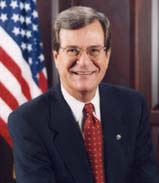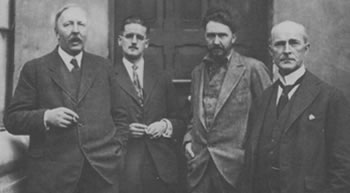December 23, 2003

Marginalia will not be updated until I return to a broadband connection in the second week of January. All best wishes for the new year.
The
Kerala Model of Development
Kerala.cc
image gallery
Paradox
in Paradise
Kerala History
Kerala.gov.in
Image: © Josefa Vivancos Hernandez, 2000.
December 22, 2003

Kenneth Rexroth
22 December 1905 ~ 6 June 1982
I regret not finding time today properly to note Rexroth’s interest in and poems of Japan. The interest brought Japan to a generation of readers and many of those readers to Japan, and the poems are among the most beautiful that have been written of the country in English. I refer among others to the poems of The Heart’s Garden / The Garden’s Heart (Pym-Randall, 1967), On Flower Wreath Hill (Blackfish, 1976), The Silver Swan (Copper Canyon, 1976), The Love Poems of Marichiko (Christopher’s Books, 1978), and The Morning Star (New Directions, 1979, which includes Flower Wreath Hill, Silver Swan, and Marichiko). For now, this, set in Higashiyama, Kyoto, November 1974, from Flower Wreath Hill:
III
The full moon rises over
Blue Mount Hiei as the orange
Twilight gives way to dusk.
Kamo River is full with
The first rains of Autumn, the
Water crowded with colored
Leaves, red maple, yellow gingko,
On dark water, like Chinese
Old brocade. The autumn haze
Deepens until only the
Lights of the city remain.
IV
No leaf stirs. I am alone
In the midst of a hundred
Empty mountains. Cicadas,
Locusts, katydids, crickets,
Have fallen still, one after
Another. Even the wind
Bells hang motionless. In the
Blue dusk, widely spaced snowflakes
Fall in perfect verticals.
Yet, under my cabin porch,
The thin, clear Autumn water
Rustles softly like fine silk.
V
This world of ours, before we
Can know its fleeting sorrows,
We enter it through tears.
Do the reverberations
Of the evening bell of
The mountain temple ever
Totally die away?
Memory echoes and reechoes
Always reinforcing itself.
No wave motion ever dies.
The white waves of the wake of
The boat that rows away into
The dawn, spread and lap on the
Sands of the shores of all the world.
VI
Clustered in the forest around
The royal tumulus are
Tumbled and shattered gravestones
Of people no one left in
The world remembers. For the
New Year the newer ones have all been cleaned
And straightened and each has
Flowers or at least a spray
Of bamboo and pine.
It’s a great pleasure to
Walk through fallen leaves, but
Remember, you are alive,
As they were two months ago.
Image: Photograph by Gerard Malanga, American Poetry Review Records, 1971-1998.
December 21, 2003

Shirin Neshat, Speechless, 1996
Shirin
Neshat, Time Europe Photo Essays, 2000
Shirin
Neshat, Carnegie International
Interview:
Identity, Culture, and Media, by Nader Vossoughian, agglutinations.com,
21 October 2003

Heinrich Böll
21 December 1917 ~ 16 July 1985
Let’s stop joking, that joke was worn out in any case, after Verdun. They were the last knights—killed in battle, too many knights, too many lovers, all at once—too many well-brought-up young people. Have you ever thought of how much pedagogical sweat was wasted in the space of a few months? All in vain. How was it none of you ever had the idea of setting up a machine gun at the entrance of the trade schools and colleges, right after the exams, and shoot dead all those radiant successful graduates? You think that’s exaggerated? Well, let me say that the truth is pure exaggeration. I danced with the graduates of 1905, 1906, and 1907. They wore their caps, they drank their beer and I drank with them at their student parties—but more than half the students of those three years fell at Verdun.
Billard um halb zehn / Billiards at Half-Past Nine, English translation by Patrick Bowles (1959; Weidenfeld and Nicolson, 1961).
Heinrich
Böll Foundation
An
Essay on the Reason of Poetry, Nobel Lecture, 2 May 1973
Empire and Resistance
An Interview with Tariq Ali
by Rafael Hernandez
CounterPunch, 20-21 December
The most startling aspect of the 21st century—something that is genuinely new—is that we have, for the first time in human history, the existence of a single Empire. This is not the abstract utopian “empire” of Hardt-Negri, but something very concrete and real. The dominant position of the United States has no precedent in history. The figures speak for themselves: there are 189 member states of the United Nations, there is a US military presence in 121 countries. (more)
The Cultural Imperative for Japan in a Globalized World
Chuang Peck Ming, Business Times, Singapore, 21 December 2003
Sticking to old ideas and not opening up to new ideas from outside is shackling Japan. (more)Japan Postures to Play Catch-up with China
Brad Glosserman, Asia Times, 20 December 2003
Reprinted from Pacific Forum CSIS
It’s hard to get excited about last week’s Japan-ASEAN summit. The decision to foster a new “special relationship” between the two could be historic, but the economic free-trade areas that will provide its foundation look like long shots. Japanese efforts are likely to be frustrated by the same political forces that have blocked previous initiatives. That is a pity, not only for Japan, but for the Southeast Asian governments that seek a rejuvenated relationship with Tokyo. (more)
December 20, 2003

Trent Lott, US Senate Majority Leader,
until 20 December 2002
Strom Thurmond,1948:
I wanna tell you, ladies and gentlemen, that there’s not enough troops in the army to force the southern people to break down segregation and admit the nigger race into our theatres, into our swimming pools, into our homes, and into our churches. [Applause]listen (mp3 / 164k), stromwatch.com, thanks
Trent Lott
5 December 2002
I want to say this about my state: When Strom Thurmond ran for president [in 1948], we voted for him. We’re proud of it. And if the rest of the country had followed our lead, we wouldn’t have had all these problems over all these years, either. [Applause]Talking Point Memolisten (mp3 / 105k), stromwatch.com
Josh Marshall, 6 December 2002
Thurmond ran as the presidential candidate on the “States-Rights Democrat” or “Dixiecrat” ticket—a candidacy that was based exclusively and explicitly upon the preservation of legalized segregation and opposition to voting rights and civil rights for blacks.Lott Steps Down as Majority LeaderThere’s a sort of agreement in Washington these days—with Thurmond’s retirement and hundredth birthday—to sort of forget about all that unpleasantness.
But look at what Trent Lott said about that candidacy yesterday . . .
CNN.com, 20 December 2002
Bloggers Catch What Washington Post Missed
Oliver Burkeman, Guardian, 21 December 2002
Blogs
Make the Headlines
Noah Shachtman, Wired News, 23 December 2002
The Radiator of Rhetoric
 Trent
Lott, 25 September 2003
Trent
Lott, 25 September 2003
The President has asked for $87 billion to help complete our mission in Iraq and Afghanistan. After much analysis and some frank, probing questions to the Administration, I’m supporting it. . . .[We cannot] expect nations like France to provide real leadership. They will not, and cannot, fight terrorists effectively. Nations from around the world should contribute to stabilizing Iraq, Afghanistan and any other locale now fertile ground for democracy—places where we can deny terrorism a base camp. However, America must lead. I watched a television interview recently with a lady from England, and reporters asked her why Europeans do not feel good about Americans right now. She replied, “It’s because you are leaders. The world expects you to do the job, and they are jealous of you when you do that job.” (more)
The
Bravest State
Trent Lott, 23 October 2003
[The] part-time personnel of our [Mississippi] Guard and Reserve and those of our full-time armed forces are the reason I voted in favor of President Bush’s request for $87 billion for America’s mission in Afghanistan and Iraq. . . .I don’t want to see our troops stay in Iraq or Afghanistan as long as they’ve been in the Balkans, and neither does President Bush. However, most Americans understand that fighting terrorists and establishing democracy in Iraq and Afghanistan is America’s most important task right now . . . . (more)
lott.senate.gov
Lott
on the Issues
If you can possibly imagine what to say, contact
Senator Lott
December 19, 2003

19 December 1915 ~ 11 October 1963
Ah, la Piaf est morte, je peux mourir aussi.
Jean Cocteau (5 July 1889 ~ 11 October 1963), 11 October 1963
Edith Piaf @ radio
france internationale
Edith
Piaf’s Paris, by J. M. Smethurst
EdithPiaf.com
Musée
Edith Piaf
Japan, Kindly Stay Out of Iraq
Mahdi Elmandjra, Japan Today, 16 December 2003
The moment that all lovers of Japan throughout the world were fearing has arrived. Japan has decided to send troops to Iraq. Whatever semantic expressions may be used it is a military intervention without legal international backing. The meaning of the initiative is clear. (more)
Hiroshima?
George W. Bush
18 February, 2002, Tokyo
My trip to Asia begins here in Japan for an important reason. It begins here because for a century and a half now, America and Japan have formed one of the great and enduring alliances of modern times. From that alliance has come an era of peace in the Pacific.The 2004 Presidential (Mis)Speak Calendar is available for purchase.
December 18, 2003

Oriental Feast
Paul Klee, 18 December 1879 ~ 29 June 1940
Klee @ WebMuseum,
Paris
Klee @ archive.com



